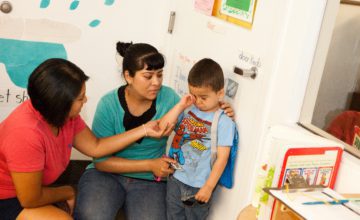Sociability describes how children approach social situations and interactions.

Some children are cautious around people they don’t know. They often need time and support from trusted caregivers before they feel comfortable enough to interact and may be very happy to play on their own or with just a small group of familiar friends or adults.
For the children in your care who are slow-to-warm-up, try the following strategies:
- Think of yourself as a safe home base. Introduce the child to new people from the safety of your arms. Place them on your lap near another child and talk about what the other child is doing in a soothing, reassuring voice. Communicate positive feelings toward others nonverbally. Use your facial expressions and body language. Children look to you for cues.
- Pair a slow-to-warm-up child with another child who is a bit more outgoing, but who will not overwhelm him. Helping him feel comfortable with one child at a time will help him eventually feel more at ease with the larger group.
Children who approach new people—adults and children—usually eagerly seek out connections with new people by smiling, cooing, talking to them, and looking them in the eye, and they give off a sense that they are open and easygoing, which brings about warm, positive responses from those they meet.
For the glad-to-meet-you kids, try the following strategies:
- Provide lots of opportunity for social interaction. The glad-to-meet-you child thrives on it. Visits to the park, the public library, free local children’s events, and even trips to the supermarket will be fun opportunities to people watch, connect with others, and chat.
- Be ready to step in when needed. Even the most sociable child will sometimes need help resolving an argument or soothing hurt feelings. Watch for well-intended over-enthusiasm. Sometimes, children get so excited to be with their friends that they can knock another toddler over during a hug or even bite another child. Help toddlers learn to express their excitement in acceptable ways.



